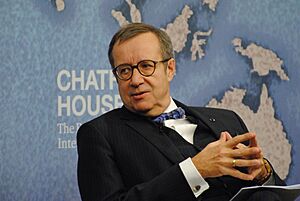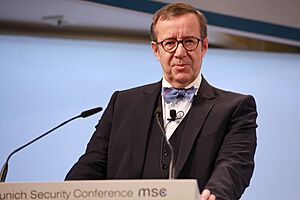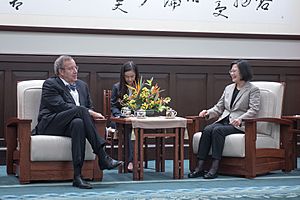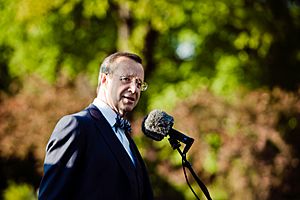Toomas Hendrik Ilves facts for kids
Quick facts for kids
Toomas Hendrik Ilves
|
|
|---|---|
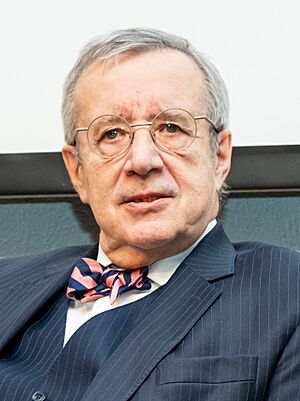
Ilves in 2025
|
|
| 4th President of Estonia | |
| In office 9 October 2006 – 10 October 2016 |
|
| Prime Minister | Andrus Ansip Taavi Rõivas |
| Preceded by | Arnold Rüütel |
| Succeeded by | Kersti Kaljulaid |
| Minister of Foreign Affairs | |
| In office 25 March 1999 – 28 January 2002 |
|
| Prime Minister | Mart Laar |
| Preceded by | Raul Mälk |
| Succeeded by | Kristiina Ojuland |
| In office November 1996 – October 1998 |
|
| Prime Minister | Tiit Vähi Mart Siimann |
| Preceded by | Siim Kallas |
| Succeeded by | Raul Mälk |
| Personal details | |
| Born | 26 December 1953 Stockholm, Sweden |
| Political party | Social Democratic Party (Before 2006) Independent (2006–2025) Volt Europa (2025-present) |
| Spouses |
Merry Bullock
(m. 1981; div. 2004)Evelin Int
(m. 2004; div. 2015)Ieva Kupče
(m. 2016; div. 2023) |
| Children | 4 |
| Alma mater | |
| Signature | |
Toomas Hendrik Ilves was born on December 26, 1953. He is an Estonian politician. He served as the fourth president of Estonia from 2006 to 2016.
Before becoming president, Ilves worked as a diplomat and a journalist. He was also the leader of the Social Democratic Party in the 1990s. He served as the Minister of Foreign Affairs twice. First from 1996 to 1998, and again from 1999 to 2002. Later, he was a Member of the European Parliament from 2004 to 2006. He was elected President of Estonia in September 2006. His term began on October 9, 2006. He was reelected by the Estonian Parliament in 2011. In May 2025, Ilves joined the Volt Europa political party.
Contents
Early Life and Education
Ilves was born in Stockholm, Sweden. His parents, Endel and Irene Ilves, left Estonia during World War II. They fled after the Soviet Union took control of Estonia.
He grew up in the United States, living in Leonia, New Jersey. He finished Leonia High School in 1972 as the top student. He earned a bachelor's degree in psychology from Columbia University in 1976. He then received a master's degree in the same subject from the University of Pennsylvania in 1978. He also received an honorary degree from St. Olaf College in 2014. Besides his native Estonian, Ilves also speaks English, German, Spanish, and Latvian.
Career Highlights
Ilves worked as a research assistant at Columbia University from 1973 to 1979. He then taught English in Englewood, New Jersey. From 1981 to 1985, he worked in Vancouver, British Columbia, Canada. There he directed arts programs and taught Estonian literature.
From 1985 to 1993, Ilves was a journalist for Radio Free Europe in Munich, Germany. He led its Estonian section starting in 1988. After Estonia became independent again in 1991, Ilves became Estonia's Ambassador to the United States in 1993. He also served as Ambassador to Canada and Mexico at the same time.
In December 1996, Ilves became the Estonian Minister of Foreign Affairs. He held this role until September 1998. He then joined a small opposition party. Ilves was later elected chairman of the People's Party. This party worked with the Moderates, a centrist party. After the March 1999 election, he became foreign minister again. He served until 2002. He strongly supported Estonia joining the European Union. He helped start the talks that led to Estonia becoming a member on May 1, 2004. From 2001 to 2002, he led the People's Party Moderates. He stepped down after the party lost badly in the October 2002 local elections. In early 2004, the Moderates party changed its name to the Estonian Social Democratic Party.
In 2003, Ilves became an observer in the European Parliament. On May 1, 2004, he became a full member. In the 2004 European Parliament elections, Ilves won by a large margin for the Estonian Social Democratic Party. He was part of the Party of European Socialists group. Katrin Saks took his place as an MEP when Ilves became President of Estonia in 2006.
During his time as president, Ilves held several important roles in technology for the European Union. He led the EU Task Force on eHealth from 2011 to 2012. He also chaired the European Cloud Partnership Steering Board from 2012 to 2014. In 2013, he led a high-level group on global internet cooperation. From 2014 to 2015, Ilves co-chaired an advisory panel for the World Bank's 2016 "Digital Dividends" report. He also chaired the World Economic Forum's Global Agenda Council on Cyber Security starting in June 2014.
Since 2016, Ilves has co-chaired The World Economic Forum working group on Blockchain Technology. In 2017, he joined Stanford University as a visiting fellow. He is also a Distinguished Visiting Fellow at the Hoover Institution at Stanford University.
Ilves is part of the advisory council for the Alliance for Securing Democracy. In September 2020, Ilves was named a member of the "Real Facebook Oversight Board." This is an independent group that reviews content moderation decisions by Facebook Inc.
In 2024, a documentary about Ilves called Rebel with a Bow Tie was released. It was directed by Jaan Tootsen, who used to be Ilves's cultural advisor. The film first showed at the 28th Tallinn Black Nights Film Festival in November 2024.
After nearly 20 years as an independent politician, Ilves became a member of the Volt Europa party in April 2025. He explained this change by saying that Europe faces growing threats from other countries. He believes there is a need for practical changes in the European Parliament.
Presidential Elections
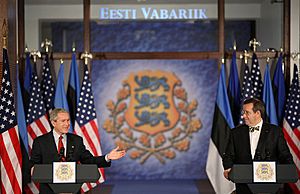
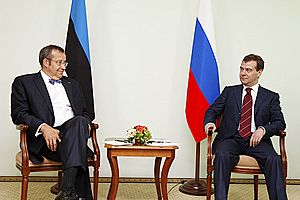
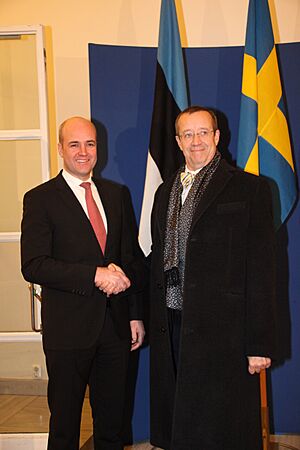
Ilves was put forward as a candidate for the 2006 presidential election on March 23, 2006. He was nominated by the Reform Party, Union of Pro Patria and Res Publica, and his own Social Democratic Party.
On August 29, Ilves was the only candidate in the second and third rounds of the election in the Riigikogu, Estonia's Parliament. He had the support of a group of parties. Ilves received 64 votes out of 65 ballots. However, he needed a two-thirds majority in the 101-seat Riigikogu, so he was not elected by Parliament. His candidacy then moved to the Electors' Assembly.
On September 13, 2006, 80 well-known intellectuals publicly supported Ilves. Famous people like Neeme Järvi, Jaan Kross, Arvo Pärt, and Jaan Kaplinski signed a statement for him.
On September 23, 2006, he received 174 votes in the first round of the election in the Electors' Assembly. This meant he was elected the next president of Estonia. His five-year term began on October 9, 2006.
On August 29, 2011, he was reelected for a second five-year term by the Parliament. His opponent was Indrek Tarand. Ilves received support from 73 members of Parliament. He was the first candidate to be elected in the first round since Estonia became independent in 1991.
Personal Life
Ilves has been married three times. With his first wife, Merry Bullock, he has two children. In 2004, Ilves married Evelin Int-Lambot, and they have one daughter. They divorced in April 2015. In January 2016, he married Ieva Kupče, who worked in cybersecurity in Latvia. They have a son. They divorced in December 2023.
He uses Twitter to share his thoughts on current events and his interests, usually in English.
Ilves has a brother, Andres Ilves. Andres used to lead the Persian and Pashto World Service for the BBC. He also led the Afghanistan office for Radio Free Europe/Radio Liberty.
Toomas Hendrik Ilves is a member of the Estonian Students' Society.
Awards and Honours
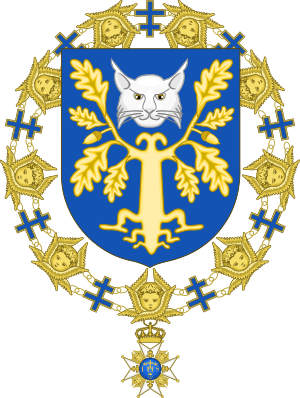
Ilves has received many awards and honours from Estonia and other countries. These include:
- From Estonia: The Collar of the Order of the Cross of Terra Mariana (2006) and the Collar of the Order of the National Coat of Arms (2008).
- From other countries: The Grand Cordon of the Order of Leopold from Belgium (2008), the Grand Cross with Collar of the Order of the White Rose of Finland from Finland (2007), and the Commander of the National Order of Legion of Honour from France (2001). He also received honours from Greece, Georgia, Hungary, Iceland, Japan, Kazakhstan, Latvia, Lithuania, Malta, Netherlands, Norway, Poland, Romania, Slovakia, Spain, Sweden, and the United Kingdom.
He has also received international awards and honorary degrees:
- 2013 NDI Democracy Award by the National Democratic Institute
- 2014 Freedom Award by the Atlantic Council
- 2015 Aspen Prague Award by the Aspen Institute
- 2016 Knight of Freedom Award by The Casimir Pulaski Foundation
- 2016 John Jay Award by Columbia College, Columbia University
- 2017 Reinhard Mohn Prize by the Bertelsmann Stiftung
- 2017 World Leader in Cybersecurity Award by the Boston Global Forum
- Honorary Doctorates from Tbilisi State University (Georgia, 2007), John Paul II Catholic University of Lublin (Poland, 2010), and St. Olaf College (United States, 2014).
See also
 In Spanish: Toomas Hendrik Ilves para niños
In Spanish: Toomas Hendrik Ilves para niños
 | William Lucy |
 | Charles Hayes |
 | Cleveland Robinson |


